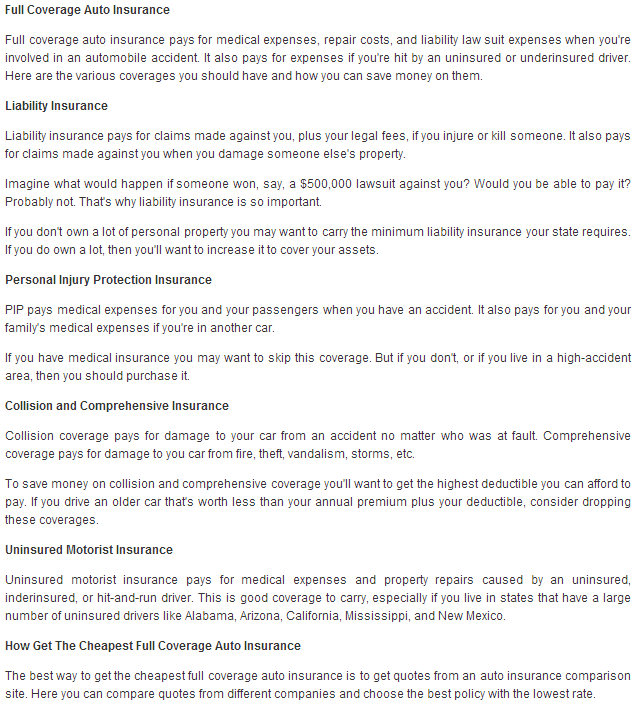
Full Coverage Auto Insurance is as varied because vehicles on the road. Whether the automobile is a new hybrid being utilized as a daily driver, a sports car that sees the sunshine of the first day week each year, or perhaps an old pickup used like a work truck, an a Full Coverage Auto Insurance policy can provided helpful, and required, protection. Different types of vehicle insurance provide different levels of coverage. The most basic Full Coverage Auto Insurance is liability automobile insurance, that is normally enough coverage to meet state laws. Comprehensive Full Coverage Auto Insurance includes coverage for vehicle damage regardless of fault, therefore the person who caused the accident could get their vehicle repaired under their vehicle insurance policy. In addition, there are several important Full Coverage Auto Insurance riders, or policy additions.
Liability vehicle insurance can be written as a combined single limit coverage or split limit coverage. The coverage emerges for bodily injury and property damage. Combined single limit Full Coverage Auto Insurance lists a total amount of coverage that covers both bodily injury and property damage. Split limit vehicle insurance coverage has specific limits for bodily injury and property damage expressed in the Full Coverage Auto Insurance policy. Liability automobile insurance does not cover the price of bodily injury or damage for that at fault party in your vehicle accident. Liability Full Coverage Auto Insurance also typically reaches rented vehicles, so the Full Coverage Auto Insurance policy offered throughout a vehicle rental is not always necessary.
Full Coverage Auto Insurance is an expanded vehicle insurance policy which offers more protection than basic liability auto insurance. Full coverage car insurance is made up of two basic components: collision automobile insurance coverage and comprehensive vehicle insurance coverage. Collision auto insurance coverage provides coverage for vehicles damaged in collisions. Collision auto insurance coverage features a deductible that must definitely be paid, but damages beyond which can be covered by the collision vehicle insurance coverage. Collision automobile insurance coverage is often required when applying for a loan to buy a vehicle. Comprehensive vehicle Full Coverage Auto Insurance the cost of damages from any other cause besides a collision. These include, but are not tied to, fire, theft or attempted theft, or damage from animals.
Full Coverage Auto Insurance plans are required in nearly every state, and proof of vehicle insurance can be required within obtaining or renewing a driver's license. The basic liability car insurance coverage is necessary so that drivers usually are not stuck footing into your market for damages others cause. Comprehensive car insurance provides protection that won't only pay for damages for the other party, and also pay to fix your vehicle at the same time. Contact your independent insurer to find the best Full Coverage Auto Insurance for you and your vehicle.
